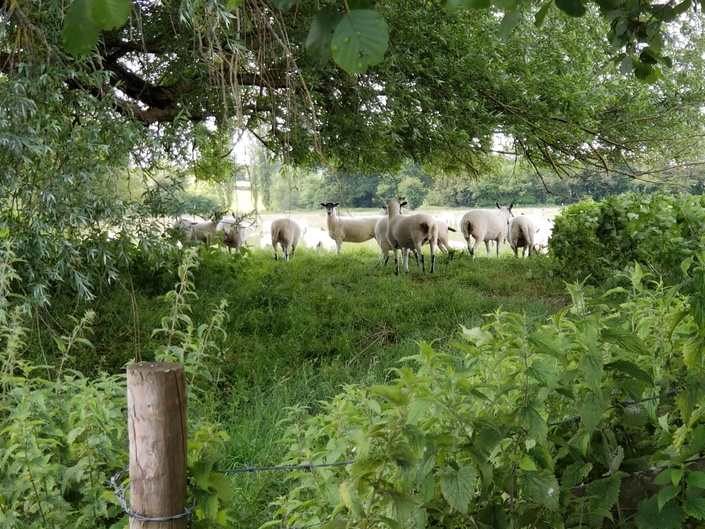
Principles of Place-Sourced Regeneration: El Salvador Case Study, May 2024 (Recording)
ONLINE MINI WORKSHOP Tuesday, May 28, 10 AM to 12:30 PM
Enroll in Course
This is a recording of our LIVE ONLINE MINI WORKSHOP that happened on May 28, 2024
We focused on a town in northeast El Salvador for our case study, but also explored locations on the coast of England and Telangana, India.
Do you ever wonder what is the specific intervention--where you live--that could indirectly change everything?
As "regenerative" becomes the latest buzz word, you've probably noticed the trend of big global initiatives that are applying generic, one-size-fits-all solutions and "best management practices" to broadly defined "issues" such as loss of biodiversity, climate change, etc. Just like big box stores, this trend has a way of degrading local cultures and economies, while a few people retain power over the design and rollout (and potentially make money by retaining power over how local lands are managed long term, in ways that tap into global markets.)
It's problematic for local communities, but it's also ineffective at actually creating meaningful or lasting change, because it's imposed by external powers so the will of local people is not engaged--rather, people are "incentivized" by payments or promises. To make lasting change, we need to learn to see the uniqueness of the structures, systems and processes of each Place, and through that to understand what the right step is to awaken the potential of what is right in front of us.
For example, here are two successful projects:
- In the Hwange region in Zimbabwe, Precious Phiri realized she had to help villagers see the value in putting individual household cows into a shared herd to restore life to degraded dryland grazing lands, and learn decision-making frameworks to manage the livestock and monitor the results. This single intervention has had stunning results on the water, soils, grasslands, insect population, and human lives.
- In Andhra Pradesh India, Vijay Kumar saw the potential in women farmers who were already organized in Self Help Economic Groups to kickstart a natural farming movement. They already had major concerns about the physical and mental health effects of pesticide use, and were already working to lift their villages out of poverty. These women have inspired 850,000 farmers to change the way they farm. Early on, the initiative also gained momentum from the charisma of a guru-like natural farming teacher who represented one part of India’s culture, but then shifted toward a more secular approach once it had gained critical mass.
That's what we do on a weekly basis in the weekly meetings of the Land and Leadership Development Community. This workshop will give you a taste of our way of working.
Through an interview process using living-systems frameworks, we will see how incredibly different each place is, and why we can't apply generic solutions. We will explore one very specific place from among the international participants' locations--one that none of us has thought about before in this way (including me). Participants will have a chance to apply the same frameworks to their own places and projects as we go along.
- Here's one more example: in the steep rocky hillsides of Vermont (where I live), all the forests were cut down for sheep farming 150 years ago, so soils are shallow and water doesn’t soak in. Many of the beavers were killed and they are still being trapped, so streams run fast, and the roads are all built on former deer trails along streambeds–making runoff and flooding a huge issue in my region. Would Precious’ approach or Vijay’s approach work here? Unlikely. We need to come up with our own unique intervention.
This is the first in a series of short workshops I’ll be teaching this spring and summer to introduce the work we do in our amazing, ongoing, weekly meetings of the Land and Leadership Development Community.
Your Instructor
Didi Pershouse is well known as an innovative international educator both in-person and online. She is the founder of the Land and Leadership Initiative. Her facilitator's guide Understanding Soil Health and Watershed Function, is used in over 60 countries.
She became deeply involved in the intersection of food systems and health systems while providing rural health care for two decades at The Center for Sustainable Medicine, and wrote The Ecology of Care: Medicine, Agriculture, Money, and the Quiet Power of Human and Microbial Communities.
Currently she is writing a field training manual for the UN-FAO Farmer Field School Program and the Andhra Pradesh Community Managed Natural Farming Initiative in India, involving over 800,000 smallholder farmers. She was a contributing author to The Climate Emergency: How Africa Can Survive and Thrive; Climate Change and Creation Care; and Health in the Anthropocene. She was one of five speakers at the United Nations-FAO World Soil Day in 2017.
She serves on the Planning Commission for her town, is a board supervisor for the White River Natural Resources Conservation District, and is on the board of directors of the Soil Carbon Coalition and the Vermont Healthy Soils Coalition. While serving on the state appointed Payment for Ecosystem Services and Soil Health Working Group, she helped to reorient the program back to its public roots. She led a successful effort to conserve the Zebedee Headwaters Wetland while serving as a Vermont Conservation Commissioner.